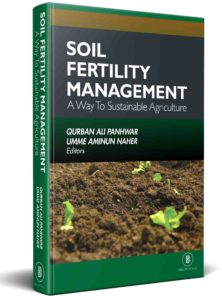Good management of soil ensures that mineral elements do not become deficient or toxic to plants, and appropriate mineral elements enter the food chain. Soil management is important both directly and indirectly to crop productivity, environmental sustainability and human health at large. Because of the projected increase in world population and the consequent need for the intensification of food production, the management of soil will become increasingly prominent in the coming years. To achieve future food security, the management of soil in a sustainable manner will be the challenge, through proper nutrient management and soil conservation practices.
The present book entitled Soil Fertility Management: A Way to Sustainable Agriculture is an overview of soil fertility degradation and its management. The whole subject matter has been compiled in 18 chapters. With its application oriented and interdisciplinary approach, the book will serve as an useful resource to students, teachers, researchers, scientists, policy makers in figuring out the latest in soil science, agronomy, crop science, environmental science and agriculture.
1. Soil Management for Sustainable Agriculture
2. Impacts of Organic Zero Tillage Systems on Crops, Weeds, and Soil Quality
3. The Roles of Arbuscular Mycorrhizal Fungi (AMF) in Phytoremediation and Tree-herb Interactions in Pb Contaminated Soil
4. Biofertilizers Function as Key Player in Sustainable Agriculture by Improving Soil Fertility, Plant Tolerance and Crop Productivity
5. Long-Term Effects of Irrigation with Waste Water on Soil AM Fungi Diversity and Microbial Activities: The Implications for Agro-Ecosystem Resilience
6. The Impact of Afforestation on Soil Organic Carbon Sequestration
7. Impact of Climate Change on Arid Lands Agriculture
8. Impacts of Agricultural Management and Climate Change on Future Soil Organic Carbon Dynamics in
9. Estimating Annual Soil Carbon Loss in Agricultural Peatland Soils Using a Nitrogen Budget Approach
10. Impact of Soil Heavy Metal Pollution on Food Safety
11. Pesticide Side Effects in an Agricultural Soil Ecosystem as Measured by amoA Expression Quantification and Bacterial Diversity Changes
12. Effect of Different Fertilizer Application on the Soil Fertility of Paddy Soils
13. Soil Tillage Management Affects Maize Grain Yield by Regulating Spatial Distribution Coordination of Roots, Soil Moisture and Nitrogen Status
14. Integrated Nutrient Management for Rice-Wheat Cropping System in a Recently Reclaimed Soil
15. Biochemical and Molecular Characterization of Potential Phosphate-Solubilizing Bacteria in Acid Sulfate Soils and their Beneficial Effects on Rice Growth
16. Understanding Plant-Microbe Interactions for Phytoremediation of Petroleum-Polluted Soil
17. Global Nitrogen Budgets in Cereals: A 50-year Assessment for Maize, Rice and Wheat Production Systems
18. Chemical Footprints of Anthropogenic Nitrogen Deposition on Recent Soil C:N Ratios


